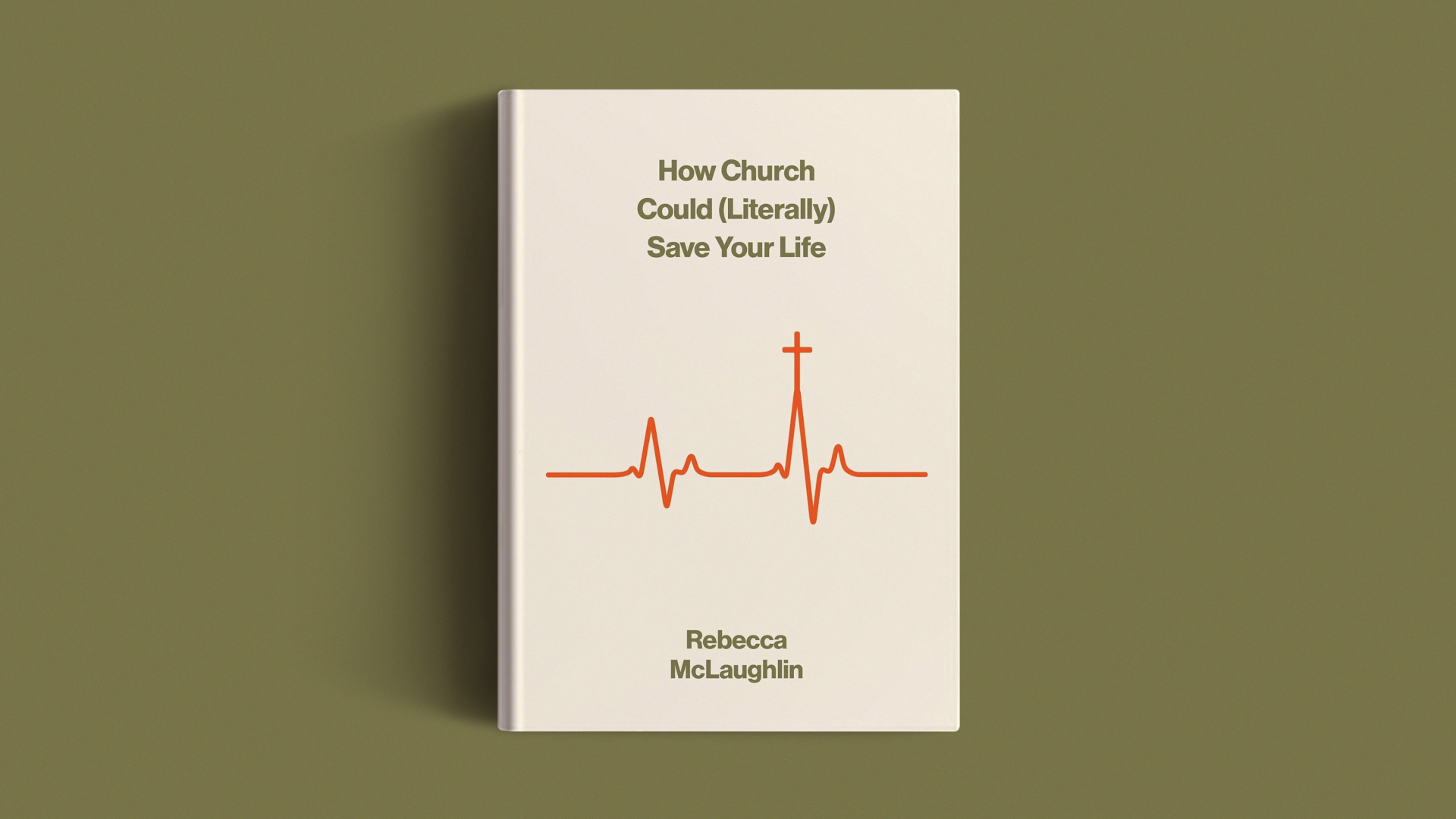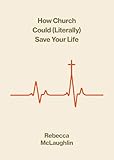Each year, people around the world spend trillionsof dollars on health and wellness products. In the US alone, wellness spending accounts for $500 billion annually and is growing at a rate of about 5 percent yearly. A quest for optimal health inspires consumers to invest not only in medical care and counseling but also in vital-signs-monitoring apps, dietary supplements, essential oils, fitness equipment, and a host of gadgets promising better sleep, less stress, and a longer lifespan.
In her latest book, Rebecca McLaughlin, author of the award-winning Confronting Christianity, offers a surprising new remedy for those chasing after health. The cure she recommends doesn’t populate influencers’ top ten lists. It requires no health insurance or physician approval, and market research doesn’t quantify it.
Yet “the script is for something that—if taken at least weekly—could elongate your life expectancy by seven years, significantly increase your chance of happiness, and substantially reduce the likelihood you’ll suffer from depression.”
What could this impressive prescription be? A vitamin? A step-counting app? An intermittent-fasting regimen?
McLaughlin suggests none of these. Rather than pills or strength training, for optimal wellness she recommends a resource freely available to all and life-giving for those who pursue it: church.
In her latest, brief book, How Church Could (Literally) Save Your Life, McLaughlin highlights the mental, physical, moral, and spiritual benefits of regular church attendance. She writes for a skeptical younger audience, an astute approach as Gen Z and millennials are the generations most interested in health and longevity and least likely to cite a religious affiliation.
Among all the consumer groups devoting their dollars to the wellness industry, younger generations have contributed most to its growth. Although Gen Z and millennials make up around a third of the adult population in the US, they drive more than 40 percent of annual wellness expenditures. Immersion in social media at least partially contributes. Gen Zers are more likely than others to seek out health information online rather than see a doctor, and in 2024 wellness content saw the highest growth surge among topics on Instagram.
The prevalence of such online content hints at a deeper issue: a desperation to feel better. Gen Zers and millennials have higher levels of anxiety and burnout than their counterparts and regularly report a need for more effective mental health services. In a quest to stave off exhaustion and find meaning, many turn to the latest diets, supplements, exercise regimens, massage tools, health-tracking devices, and even IV drips for relief. Yet they don’t seek out the support of a church. In fact, research has identified Gen Z as the most religiously unaffiliated generation of our time, with most identifying as “nones.”
In How Church Could (Literally) Save Your Life, McLaughlin reveals a deep understanding of these struggles and offers a pathway for true healing. As she does in Confronting Christianity, McLaughlin demonstrates keen insight into the reservations of young skeptics.
“Maybe you identify as ‘spiritual, but not religious,’” she writes, implying she’s conversed with nones who have described themselves in these terms. “You’d rather climb a mountain or gaze up at the stars than go to church. Perhaps you’ve been put off by racism, abuse, hypocrisy, or hateful attitudes.”
Throughout, McLaughlin maintains a respectful and sympathetic tone, acknowledging each objection as a “fair question” and inviting rather than compelling readers to consider her viewpoint. “I’m honored you’d take time to read this book,” she writes. “You’re likely someone who thinks carefully and wants to see the data before you make a decision.”
McLaughlin outlines compelling research on the physical and mental health benefits of church attendance. She draws heavily from the work of Tyler VanderWeele, professor of epidemiology and director of the Human Flourishing Program at Harvard University’s T. H. Chan School of Public Health. Unlike researchers on this topic from decades past, who primarily produced underpowered cross-sectional studies, VanderWeele and his contemporaries have conducted robust longitudinal studies with cohorts numbering in the tens of thousands.
The findings are striking. Church attendance reduces all-cause mortality by nearly 30 percent over a 15-year period and protects woman against suicide by 400 percent. Weekly churchgoing in women over 40 is as protective against death as annual mammograms, McLaughlin writes. Those attending services more than weekly at age 20 have “a roughly seven-year greater life expectancy than their nonchurchgoing peers.” Churchgoing protects against alcohol, smoking, and drug abuse and decreases the odds of depression by one-third.
Why does a Sunday-morning service confer such dramatic health benefits? Investigators have suggested that social connection and moral beliefs play a role, although they don’t explain the entire effect. In one large study, social support was responsible for only a quarter of the mortality benefit observed with church attendance. “Parents who join the same people each week to cheer for their kids’ sports team won’t see the same level of benefit,” McLaughlin writes. “We humans seem to thrive when we worship together.”
McLaughlin expects this evidence of thriving through worship to surprise readers. “The benefits of ‘organized religion’ don’t fit with the big story we are telling in the West about the goodness of abandoning traditional beliefs,” she writes. This “big story” that we can achieve happiness through our own self-determination, McLaughlin argues, hasn’t delivered on its promises. Although the youngest generations prize self-definition and freedom from constraints, they have the highest rates of anxiety and depression ever measured. McLaughlin summarizes how such ideology has failed to bear fruit:
Many in the West today attempt to fill in their spiritual gap with New Age practices, a range of sexual relationships, and substance use. More people are in therapy and on antidepressants than at any other time. And yet our mental health across the West has nose-dived. … All our freedom to experiment and self-define without constraints has bred more misery than happiness.
McLaughlin links dismal mental health outcomes with smartphone use and the pandemic but also notes a correlation with declining church attendance:
The results of what has been called “the great dechurching” in America have been measurably bad. Less churchgoing has led to lower mental health and happiness, more loneliness, more drug abuse, more alcoholism, less volunteering, less giving to those in need, reduced life expectancy, and more suicides.
Through argumentation that deftly toes the line between conviction and sensitivity, McLaughlin invites skeptical readers into the support and flourishing of church communities to counteract emptiness. To guide them, she includes a QR code to connect readers with churches, as well as FAQs to allay first-time churchgoers’ concerns. Her book is only the thickness of a gospel tract, perfect for elders to distribute to the curious and questioning.
The greatest gift McLaughlin offers her readers isn’t an invitation to church, however. It’s an invitation into a relationship with the one who makes church so priceless in the first place.
As someone leery of pragmatism, I confess I was wary when I received McLaughlin’s book. The true allure of church isn’t its health benefits or even its social community but the gift of worshiping the God who gave his one and only Son. Period. We worship because he deservesit. He’s worthy of our time, attention, and adoration, and against the backdrop of God’s holiness, all practical justifications for church ring hollow or even seem degrading.
I was relieved and delighted, however, to discover that although McLaughlin hooks readers with promises of wellness, she lands at the true heart of the matter: the gospel. Drawing from Matthew 9:12–13, McLaughlin emphasizes that more than we need self-help books, pills, or uninterrupted sleep, we need Jesus:
The great physician doesn’t merely pop a magic pill into our hands and wish us luck. He takes our moral sickness on himself and gives his life in place of ours. … In the end, you could attend church all your life and live to ninety-five and never take the pill that really counts.
In How Church Could (Literally) Save Your Life, McLaughlin introduces skeptics to data, invites them to church, and finally guides them toward the one by whose wounds we are healed—no pills, planks, or apps required.
Kathryn Butler is a writer and a former trauma surgeon. Her books include The Dream Keeper Saga series and Between Life and Death: A Gospel-Centered-Guide to End-of-Life Medical Care.
















